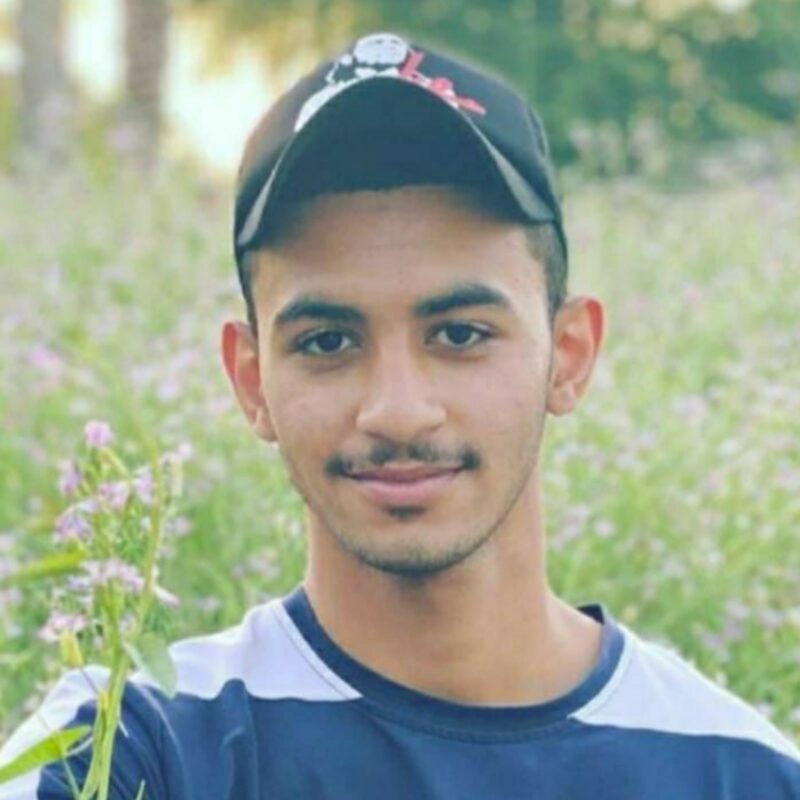Hasan Ali Rashed is a 18-year-old Bahraini from Karrana, who is charged along with 20 others in a terrorism case known as “Al-Ashtar Brigades”. He was arbitrarily arrested, prevented from completing his studies, and tortured during investigations. He is currently serving his sentence at Jau prison.
At approximately 5:00am on 26 November 2021, a group of Bahraini masked riot police, including some in civilian clothing stopped his dad while he was heading out to pray at the front door. They asked him, how many children does he have, he answered he only has one called Hasan, so they replied then it’s him. They raided his home presenting a warrant, but didn’t let his father read it. They scattered inside his house without presenting a search warrant, entered Hasan’s room on the second floor and inspected it while filming. They refused to allow them to pray or even use the bathroom while they were searching. They handcuffed him, confiscated his ID and cell phone before taking him without informing his family about their destination.
Hasan was brought to the Central Investigation Department (CID) and remained there for four days. The day after his arrest, he called his family to inform them where he was and hung up shortly afterwards. He also called his family on the third day and informed them it was his last day at the CID. His mother tried to call many times to check up on him and ask about the reasons for his arrest. However, they did not answer the phone. During investigation, the officers physically tortured him. They beat him in the investigation building to the point of death, and threatened him with electric shock and rape. The officers also forced him to sign the pre-prepared interrogation report under the threat of death without reading it. During his torture and interrogation, Hasan was denied access to a lawyer, and they didn’t let his family be present although he is still a minor.
He was transferred on 30 November 2021 to the Public Prosecution Office (PPO) which ordered his transfer to Dry Dock Detention Center, specifically to the tenth ward. At the center, he was also deprived from calling his family and informing them about his whereabouts. Approximately a week after, he was able to video call his family for the first time, where they did not notice any signs of torture. After that, he didn’t contact his family at all leaving them worried and waiting for his next call. After some days, Hasan contacted his family with the help of his cellmate who asked his family to link Hasan’s family in their call. Hasan asked for clothes and money, and his family informed him that the Prosecution had ordered his detention for 60 days. He didnt state the details about what had happened with him at the Public Prosecution Office (PPO), but neither a lawyer nor a guardian were present with him. When his dad went to deliver his clothes and money to Dry Dock Detention Center, the management accepted the money but refused to take the clothes. Even Though the money was delivered to Hasan, he didn’t call. His family got worried, so his mom called again and asked them to allow her to talk to her son, but they answered yet again that the number of detainees is large, because of that the calls had been delayed. After some days, Hasan called and told her about the torture he endured during his 4 days stay at the CID, but didnt go into details, afraid to hurt her feelings.
While he was detained at Dry Dock Detention Center, Hasan asked the management to appoint a lawyer, but he waited even though some of the detainees were allowed to sign a power of attorney. Moreover, he has not been allowed to see his parents so far, except for one video call. During the call, the police officer was sitting close so he was unable to speak freely and violated his privacy. Additionally, he has been deprived of his right to continue his secondary education.
Hasan was charged with joining a terrorist cell, possession of explosive devices, weapons and ammunition, military training, receiving and delivering money from the terrorist cell, and arson.
On 15 January 2023, the First High Criminal Court sentenced Hasan to 3 years in prison in a mass trial involving twelve defendants in a case known as “Al-Ashtar Brigades”. The sentence was upheld by the court of appeal on 29 May 2023.
Recently, Hassan, along with several other political prisoners, has been suffering from scabies due to the policy of medical negligence. He has also contracted the coronavirus three times and is experiencing the spread of warts on his hands and toothache. Despite that, he has not received proper medical treatment.
Hasan’s treatment by the Bahraini authorities through his arbitrary arrest and torture violates international law, particularly the Convention against Torture and other Cruel, Inhuman or Degrading Treatment or Punishment (CAT), and the International Covenant on Civil and Political Rights (ICCPR), of which Bahrain is a party. Additionally, the lack of medical care during his imprisonment is a violation of the UN Standard Minimum Rules for the Treatment of Prisoners or the Nelson Mandela Rules. In this regard, ADHRB calls on Bahrain to fulfill its human rights obligations by releasing Hasan unconditionally. ADHRB also urges the authorities to investigate allegations of torture and ill-treatment that he has faced at the hands of prison officials and hold them accountable. We also call on Bahrain to immediately and unconditionally release all political prisoners.





